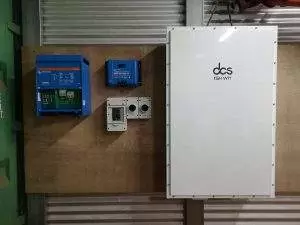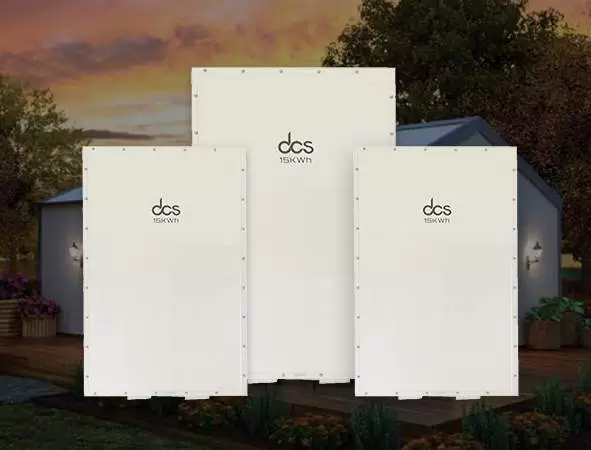Are you considering investing in a solar system for your home? You’re making a wise decision! Installing a solar system has many benefits, from saving money on your monthly energy bills to increasing the value of your home. In this blog post, we’ll discuss the benefits of installing a solar system, how to determine the right size system for your home, and how to make the most of your solar energy. Going solar is an investment that pays off in the long run – let’s explore why a solar system is the right choice for your home.
What is a Solar Battery Storage?
Solar storage is an essential component of a solar energy system. It stores excess energy generated by your solar panels during the day and provides power to your home when the sun is not shining. This way, you can use solar power 24/7 and minimize your dependence on the grid.
A Solar Battery Storage system consists of one or more batteries and a battery inverter. It’s typically installed in your garage or basement and is connected to your solar panels and your home’s electrical system. The size of your solar-battery storage system depends on your energy usage and how much backup power you want to have in case of a power outage.
With a solar -battery storage system, you can have peace of mind knowing that you’re prepared for emergencies, like blackouts or extreme weather events. Additionally, storing solar power in batteries allows you to take advantage of time-of-use pricing, which means you can use stored solar energy when utility rates are high to save even more money on your electricity bill.
Financial Savings: How Solar Panels Cut Your Energy Costs
One of the most significant benefits of installing a solar system in your home is the amount of money it can save you in energy costs. By harnessing the sun’s power, you’ll be able to generate electricity for your home that won’t rely on the power grid. This means you’ll no longer have to worry about rising energy costs or fluctuating energy rates.
Over time, the savings from a solar system investment can add up substantially. In fact, depending on where you live and your energy consumption, a solar system can save you tens of thousands of dollars over its lifespan.
With a solar system, you’ll also have the option to sell any excess energy back to the grid, earning credits or even money in return. And, since the cost of electricity is predicted to continue to rise, your savings will only increase in value as time goes on.
So, if you’re tired of paying exorbitant energy bills and want to save money in the long run, investing in a solar system is a wise decision that can pay off for years to come.
Increased Home Value with Solar Energy
Apart from the significant financial savings that come with installing a solar system in your home, solar energy also boosts the overall value of your property. Homebuyers are increasingly interested in energy-efficient homes, and solar-powered homes are becoming more popular than ever.
Solar energy systems are seen as an attractive investment as they provide long-term financial returns by lowering utility bills. Installing solar panels on your property will significantly reduce your reliance on traditional energy sources, resulting in considerable energy savings over time. These savings translate into higher resale value when you decide to sell your property.
Moreover, installing a solar energy system in your home signifies your commitment to the environment. Potential buyers are increasingly prioritizing sustainable features in their home search. So, having a solar system on your property could be a unique selling point that sets your home apart from the rest in the market.
Positive Environmental Impact of Solar Power
Solar power is not only beneficial for homeowners in terms of financial savings and increased home value, but it also has a positive environmental impact. Choosing solar is an excellent way to reduce your carbon footprint and contribute to a cleaner, more sustainable future.
First and foremost, solar energy is a renewable energy source. Unlike fossil fuels, which contribute to air pollution and greenhouse gas emissions, solar power is generated from the sun’s rays, which are abundant and freely available. By harnessing this clean and abundant energy source, solar systems help reduce the demand for traditional electricity generated from fossil fuels, thereby decreasing harmful emissions.
Solar power systems also have a minimal environmental impact in terms of land use. Unlike traditional power plants, solar panels can be installed on rooftops or on open spaces that are otherwise unused, minimizing the need for additional land. It allows for the preservation of natural habitats and ecosystems, promoting biodiversity and conservation efforts.
Moreover, solar energy systems do not require water for operation, unlike other forms of power generation such as coal or nuclear power plants. It is particularly significant in regions experiencing water scarcity, where solar power can help conserve this precious resource.
By investing in a solar system for your home, you become part of the solution to climate change and environmental degradation. Every kilowatt-hour of solar energy generated reduces the demand for electricity produced from fossil fuels, ultimately leading to a cleaner and greener planet for future generations.
How to Choose the Right Solar System for Your Home?
When considering adding a solar system to your home, it’s important to choose the right one for your specific needs. Here are some factors to consider when selecting a solar system:
- Energy needs: Assess your household’s average energy consumption to determine the size of the solar system required to meet your needs. A professional installer can help you calculate this.
- Available space: The amount of available roof or ground space will also impact the size of the solar system you can install. Ensure the location receives sufficient sunlight throughout the day.
- Panel efficiency: The efficiency of solar panels varies. Higher efficiency panels can generate more power with a smaller system. Be sure to compare panels to select the right one for your needs.
- Durability: Selecting durable solar panels will ensure that your system lasts for many years.
- Monitoring capabilities: Many solar systems come with monitoring software, which allows homeowners to track their system’s performance and identify potential issues quickly.
- Budget: Consider the initial investment cost and long-term savings when selecting a solar system. Financing options may also be available to help reduce upfront costs.
Financing Options for a Solar System Investment
Investing in a solar system for your home is a wise decision for financial savings and reducing your environmental impact. However, the initial cost of installing solar panels may seem daunting to some homeowners. Fortunately, there are financing options available to make this investment more accessible.
One common option is through a solar loan, where the borrower can repay the cost of the system through fixed monthly payments over a period of years. Another option is a power purchase agreement (PPA), where a third-party company will install and maintain the system on your property and you pay a fixed rate for the electricity generated.
There are also incentives available, such as federal and state tax credits, rebates, and grants, that can significantly reduce the upfront cost of installing a solar system.
It’s important to research and compare financing options to find the best fit for your budget and needs. Consider factors such as interest rates, repayment terms, and eligibility requirements. Investing in a solar system may require an initial investment, but with the right financing and incentives, it can ultimately provide long-term financial benefits for your home.
Assessing Your Home’s Solar Potential
Before you invest in a solar system for your home, it’s important to assess your home’s solar potential. It means determining how much sunlight your roof receives, as well as any obstacles that may prevent sunlight from reaching your solar panels.
First, check the orientation and angle of your roof. The ideal orientation for solar panels is a south-facing roof, although a west or east-facing roof can still work. The angle of your roof should also be considered, as a steep roof will receive more sunlight than a flat roof.
Next, evaluate any shading issues. Trees, buildings, and other obstructions can block sunlight from reaching your solar panels, reducing their efficiency. Consider the time of day and year that shading occurs to determine if it will significantly impact your solar production.
Finally, consult with a professional solar installer or use an online solar calculator to determine your potential solar energy output. It will help you determine the size of the solar system you need to power your home and the potential cost savings you can expect.
Choosing the Right Solar Battery System for Your Home
Once you’ve made the decision to go solar, it’s important to choose the right battery system to store your energy. There are several options to consider, such as the size of the battery, the brand, and the type of technology used. The most common types of battery technology are lithium-ion, lead-acid, and saltwater.
It’s important to assess your household’s energy needs when selecting the size of your battery. If you have a large family and use a lot of energy, you’ll need a larger battery than a single-person household that uses minimal energy. Additionally, it’s important to research and compare the different brands available to ensure you’re getting the best quality battery for your investment.
Another consideration is the warranty and maintenance options for the battery system. Some manufacturers offer a longer warranty than others, and it’s important to choose a system with a warranty that covers any potential issues. You’ll also want to look into maintenance requirements, such as whether the battery needs to be topped up with water or requires any specific cleaning procedures.
Choosing the right Solar Battery System is a critical aspect of investing in solar energy for your home. Take the time to research your options and consult with a professional to ensure you’re making the best choice for your energy needs and budget.
FAQs
1. How long does a solar system last?
A properly installed solar system can last for up to 25 years or more, depending on the quality of the components used and the maintenance carried out on the system.
2. Will solar panels work during cloudy days?
Yes, solar panels can still produce electricity on cloudy days. However, the amount of energy produced will be lower compared to sunny days.
3. Can I still use electricity from the grid when I have a solar system installed?
Yes, you can still use electricity from the grid when your solar system is not producing enough energy, such as during the night or on cloudy days.
Conclusion
Investing in a solar system for your home is a wise decision for many reasons. Not only can you save money on your energy bills, but you’ll also increase your home’s value and make a positive impact on the environment.
| Other Good Articles to Read |
| Skank Blogs |
| Unreal Blogs |
| Tba Blogs |
| All City Forums |
| Dany Blogs |
| Refuge Blogs |
| The Music Blogs |
| Key Forums |
| Joe Blogs |
| Blogs 4 Me |
| Blogs Emon |
| Business Listings in Australia |

